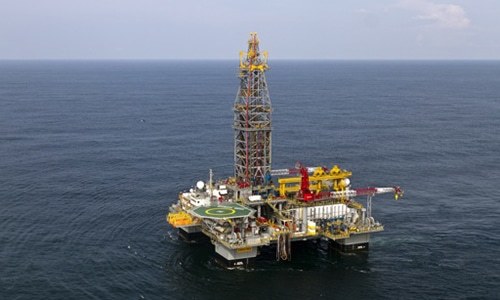ISLAMABAD: Undeterred by the recent failure of the much hyped Kekra project, the Petroleum Division has sought security clearance of a dozen offshore blocks before inviting international oil and gas exploration and production companies for bidding.
A senior government official told Dawn that a list of 12 exploration blocks in the deep and ultra-deep sea has been provided to the Ministry of Defence (MoD) for security clearance. This [security] clearance by the MoD is a pre-requisite before offering any oil and gas exploration blocks to local or foreign exploration and production firms, he said.
Technically, an exploration block with a water depth of greater than 1,000 feet is described as deep and more than 5,000 feet is ultra-deep. Any exploration not more than 1,000 feet is called shallow, he said.
For a reference, the official explained that Kekra-I (Indus-G) exploration block – drilled by ExxonMobil, ENI, OGDCL and Pakistan Petroleum to a depth of about 5,690 feet – was ultra-deep. It went dry after an expenditure of about $100million despite hype about its success at the highest government levels.
However, the data received from even the Kekra failure had given hopes for further exploration, the official said.
The proposed deep and ultra-deep offshore blocks include Offshore Indus-U over an area of 6,300 sq km, Offshore-S over 2,130 sq km, Offshore Indus-V over 7,400 sq km and Offshore Indus-W over 7,300sq km. Also included in the list are Offshore-R and Eastern Offshore Indus-A covering an area of 1,500 sq km and 2,500 sq km respectively.
The list also includes Offshore Indus-P (900 sq km), Offshore Indus-O (840 sq km), Offshore Indus-North, Offshore Indus-X, Offshore Indus-Y and Offshore Indus-Z each covering an area of about 2,500 sq km.
The exploration and development activities had been hampered over the past few years due to security situation but are now reviving. The government is currently working on processing about 17-18 exploration licences.
On November 22 last year, the Petroleum Division told the Senate Standing Committee on Petroleum that auction of 24 oil and gas exploration blocks had been delayed for more than six months because the defence ministry had not issued a security clearance.
Secretary Petroleum Mian Asad Hayauddin had reported that the Petroleum Division had requested the MOD to issue no-objection certificates (NoCs) for the 24 blocks some six months ago but the clearance was still awaited. A few of them have since been security cleared but not all, an official said.
In June 2018, then petroleum secretary Sikandar Sultan Raja had also complained to the committee that his department had been waiting for clearance for 30 to 40 exploration blocks since long.
“We have made our best efforts but these are not getting clearance from the defence ministry. This is the country’s loss,” Mr Raja had told the committee.
Informed sources said the Petroleum Division had also proposed a time-bound process for issuance of security NoCs so that fresh blocks could be offered at regular intervals to local and international companies for exploration, but in vain.
Pakistan’s total sedimentary area was said to be of about 827,268 sq km and the area currently under exploration was 224,976 sq km. The total number of fuel discoveries made in the country stood at 394 with 85 of oil and 309 of gas, the success rate being about 34 per cent, according to the Petroleum Division.
Last year in March, Prime Minister Imran Khan gave a go ahead for the creation of a dedicated security force for petroleum exploration in a bid to attract more and more companies for exploration and enhanced production of domestic oil and gas resources. However, progress could not be made on the creation of proposed special force.
Published in Dawn, January 25th, 2020













































